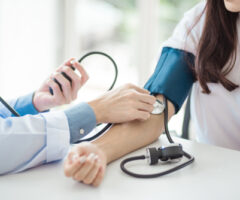Life’s Essential 8
The American Heart Association’s Life’s Essential 8 (LE8) is an updated approach to measuring cardiovascular health. It adds sleep as a component, creates a new guide to assess diet, accounts for vaping and secondhand smoke, adjusts cholesterol and blood sugar measures and scores each of the eight components to average an overall heart health score on a scale from 0-100.
Diet
Food and nutrition play a major role in life, fueling the body and brain to perform all the tasks we do, from breathing and talking to playing and learning. It also carries cultural, social and economic weight. The right diet helps you manage disease and improve your health. Keeping a healthy diet means eating the right amount of the right foods, and avoiding those that are unhealthy for you. But it also means enjoying some treats now and then if you like, as long as they are part of a balanced plan.
Physical Activity
A wide range of physical activity including walking, cycling, playing sports and engaging in active leisure activities is good for your health. It can help you maintain a healthy weight, reduce your risk of heart disease, diabetes and several cancers and improve your mental health. It can help you manage your emotions and improve your mood and self-esteem. It can also increase your energy levels and make you feel more alert and refreshed. The World Health Organization (WHO) recommends 150 to 300 minutes of moderate-intensity aerobic activity or 75 to 150 minutes of vigorous-intensity exercise, or a combination, per week to maintain or improve your health. Regular physical activity is also linked to better body composition and muscle strength.
Nicotine Exposure
Nicotine exposure has long been associated with health risks. It is a known neurotoxin that has harmful effects on the lungs, heart, and blood vessels. It is also highly addictive and can lead to a variety of negative consequences, including addiction and withdrawal symptoms. Smoking cigarettes is the primary source of nicotine exposure. Other sources include chewing tobacco, pipes, cigars, snuff, and hookahs. Adolescents are especially vulnerable to the harms of nicotine exposure. This is because the brain is still in its developmental stages at this time, and nicotine acts directly on the areas involved in cognitive control, attention, and decision-making.
Sleep
Sleep is the time your body and brain rest, recharge and repair. Without enough sleep, you can have trouble with concentration, memory, and learning. Sleep also helps with recovery from illness or injury. It supports the proteins and cells in your immune system that fight off germs, so they won’t come back again. In addition, getting sufficient sleep helps you maintain a healthy weight. It keeps your blood sugar balanced and your cholesterol in check, both of which are important factors in avoiding heart disease. It also allows your muscles and bones to grow and repair, which is vital for your overall health and wellbeing.
Body Mass Index
Body mass index (BMI) is a quick, easy way to assess your weight and is often used as part of a health checkup. However, BMI is not a reliable measure of body fatness or health and should only be used as one part of an overall healthy lifestyle plan. A high BMI increases your risk of heart disease, stroke, diabetes, gallbladder disease, sleep apnea and osteoarthritis. It also raises your risk of certain cancers, including esophageal, pancreatic, colorectal, breast and endometrial cancer. The American Heart Association recommends that adult men and women maintain a BMI of less than 25 kg/m2 or a body fat percentage of at least 10% for optimal cardiovascular health. Keeping an appropriate BMI is also associated with lower risks of developing diabetes, according to a study published in Circulation.
Blood Lipids
Lipids, or fats, are the waxy fatty molecules that provide fuel for the body and store energy. They also send signals through the body and help to form cell membranes that hold cells together. They are essential for life, and too much of one type of lipid can lead to health problems like heart disease or high blood pressure. Your doctor will usually use a blood test to measure your lipid levels, also known as a lipid panel. Cholesterol is the main lipid found in your blood. It is made by the liver and is used to make cell membranes, and it helps to produce vitamins D and certain hormones. Triglycerides are another type of lipid found in your blood. They are fats that are absorbed by your digestive tract, transported to the liver and stored in your body. When your blood lipid levels are too high, you have what is called dyslipidemia. This is a common risk factor for developing cardiovascular diseases, such as coronary heart disease or stroke. Your doctor may recommend a lipid panel as part of a comprehensive plan to manage your health.
Blood Glucose
Glucose is one of the main sources of fuel in your body. It comes from the foods you eat and is used by all of your body’s cells to make energy. Your body’s glucose levels are normally controlled by a hormone called insulin. But if your body doesn’t
make enough insulin or the insulin it does make doesn’t work properly, then you may have diabetes. Blood sugar testing is a way to find out if you have diabetes, and what your target range should be. Usually, you’ll have fasting plasma (blood) glucose levels tested before and after you drink a liquid that contains glucose. Maintaining healthy, balanced blood sugar is important for your overall health and avoiding long-term diseases like diabetes. While no single food, supplement, or workout can be the magic bullet, a whole-body approach is key to maintaining a healthy level of glucose throughout your lifetime.
Blood Pressure
Blood pressure is a measurement of the force of the blood against the walls of your arteries as your heart pumps blood. It rises and falls throughout the day, depending on your activity. If your blood pressure is too high, it can damage your arteries and heart. It can also increase your risk of stroke and other health problems. You should always have your blood pressure checked on the same arm each time. It is also important to measure it in a quiet place and not when you are upset or in pain. If your systolic (first) blood pressure reading is 120 mm Hg or higher, you should seek medical attention immediately. Rising systolic blood pressure can be a sign of stiffer arteries or a buildup of plaque in your arteries.




